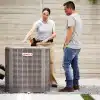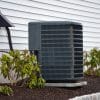Understanding the role of an AC capacitor in your air conditioning system helps you maintain your unit better.
Generally speaking, an AC capacitor stores and releases electrical energy to power the motors in your air conditioning unit. It helps start the compressor and fan motors and keeps them running efficiently. Without a functioning capacitor, your AC may struggle to start or fail to cool your home properly.
This small but crucial component keeps your AC running smoothly and efficiently. In this article, Orzech Heating & Cooling will help you understand what an AC capacitor does in an HVAC system!
1. The Basics of AC Capacitors
What is an AC Capacitor?
An air conditioner capacitor is a small cylindrical device that stores and releases electrical energy to power your air conditioning unit. Think of it as a battery that helps start and keep the AC running.
Types of AC Capacitors
- Start Capacitors: These provide the initial jolt of energy to start the motor.
- Run Capacitors: They ensure the motor runs continuously and smoothly.
- Dual Run Capacitors: These combine both start and run capacitors in one unit, typically found in HVAC systems.
2. How an AC Capacitor Works
Energy Storage
AC capacitors store and release electrical energy to power your AC unit. When your air conditioner starts, it needs a significant burst of energy to get the motors running. The capacitor compensates for this initial energy surge, ensuring smooth operation. Essentially, the capacitor charges up when your AC is off and quickly discharges when the system turns on, providing the extra boost needed for startup. This process helps in managing how much electrical current flows to the motor, preventing any power surges or short circuits that could damage your AC system.
Starting the Motor
Both the start capacitor and run capacitor play crucial roles in starting the compressor and fan motors. The start capacitor provides the initial jolt necessary to start these high-voltage parts. Once the motor is running, the run capacitor takes over to maintain a continuous flow of electricity. Without a functioning capacitor, your AC might struggle to start or not start at all. You might hear a humming noise from the outdoor unit, indicating that the motor is trying to start but can’t due to a faulty capacitor. This inability to start can lead to higher energy bills as the system draws more power without cooling effectively.
Maintaining a Steady Current
A healthy capacitor ensures a steady electrical current, allowing your air conditioner to run efficiently and prolonging the life of your unit. It helps prevent overheating and reduces wear and tear on your AC’s electrical components. By maintaining a consistent energy output, the capacitor reduces the risk of power surges and ensures that the cooling cycle finishes smoothly. This steady current flow is essential for the overall health of your HVAC system, as it minimizes the strain on the compressor and other vital components. Regularly checking and maintaining your capacitor can help avoid common issues like high energy bills, frequent AC running, and air conditioner malfunctions.
Role in the Cooling Cycle
The capacitor’s job is integral to the cooling cycle of your AC unit. As the capacitor stores and releases energy, it ensures that the compressor and fan motors operate at optimal speeds. This consistency in motor operation helps the air conditioning system circulate cool air efficiently throughout your home. If the capacitor fails, the cooling cycle can be interrupted, leading to inadequate cooling and increased wear on the system.
Protecting Against Power Surges
AC capacitors also protect your air conditioning unit against power surges. During a power surge or lightning strike, the capacitor absorbs the excess electrical energy, preventing it from reaching sensitive components like the compressor and circuit board. This protective function is crucial in maintaining the longevity and reliability of your AC unit, especially in areas prone to frequent power fluctuations. The capacitor helps keep your HVAC system safe and operational by mitigating the impact of power surges.
3. Signs of a Faulty AC Capacitor
Common Symptoms
- Your AC unit isn’t blowing cold air
- There’s a loud humming noise coming from your outdoor unit.
- Your AC won’t turn on
- AC starts and stops frequently
- There’s a burning smell from the AC
Physical Indicators
Look for signs like cracks, bulging, or oozing liquid from the capacitor. These are clear indications of a bad AC capacitor.
Testing a Capacitor
You can test a capacitor’s current using a multimeter. If the readings are off, it might need a replacement. However, it’s strongly recommended to leave this to a professional. Capacitors contain a charge and can be dangerous to handle.
4. Replacing an AC Capacitor
Safety Precautions
Always turn off the power to your air conditioning unit before attempting any repairs. Capacitors store high voltage and can be dangerous.
Step-by-Step Guide
- Disconnect the power supply.
- Locate and remove the faulty capacitor.
- Install the new capacitor, ensuring it’s the correct type and rating.
- Reconnect the power and test the unit.
When to Call a Professional
Contact a licensed HVAC technician if you’re unsure or uncomfortable with the process. They have the expertise to handle high-voltage devices safely. Capacitors are dangerous, posing a significant risk if not handled properly.
5. Benefits of a Properly Functioning AC Capacitor
Improved Efficiency
A well-functioning capacitor reduces energy bills by ensuring your AC unit runs efficiently. This leads to significant energy savings over time.
Prolonged Equipment Life
By reducing wear and tear, a healthy capacitor extends the life of your air conditioner. This saves you from frequent replacements and costly repairs.
Better Performance
Your air conditioner runs more effectively, providing consistent cooling during extremely hot temperatures. A properly working capacitor ensures your home remains comfortable.
6. Preventive Maintenance Tips
Regular Inspections
Inspect your AC capacitor regularly, especially before the cooling season starts. Catching a failing capacitor early can prevent major malfunctions.
Keeping the Unit Clean
Dust and debris can affect your AC system’s performance. Regularly clean the exterior air conditioning components to maintain efficient operation.
Professional Maintenance Services
Schedule regular check-ups with an HVAC company. A professional HVAC contractor can identify issues before they lead to a complete breakdown.
7. Conclusion
An AC capacitor is essential for the efficient operation of your air conditioning unit. Understanding what an AC capacitor does and maintaining it properly ensures your AC runs smoothly and efficiently. Regular checks and timely replacements can save you from AC repairs and ensure a comfortable indoor environment.
FAQs
1. What happens if my air conditioner’s capacitor fails?
If your air conditioner’s capacitor fails, it may struggle to start or stop running altogether. You might notice a burning smell, or a loud humming noise, or the AC unit might not blow cold air at all.
2. What is the difference between a start capacitor and a run capacitor?
A start capacitor provides the initial jolt of energy needed to start the compressor and fan motors in your air conditioning unit. A run capacitor, on the other hand, helps keep these motors running smoothly. Both types are crucial for the efficient operation of air conditioners.
3. Can power surges affect my air conditioner’s capacitor?
Yes, power surges can significantly affect your AC’s capacitor. Capacitors help absorb excess electrical energy during power surges or lightning strikes, protecting the sensitive components of an HVAC unit like the capacitor and circuit board from damage.
4. How much electrical current does an AC capacitor handle?
The amount of electrical current an AC capacitor handles varies depending on the type and size of the capacitor. Generally, capacitors range in capacity to match the requirements of different air conditioning units. Refer to your HVAC system’s manual or consult an HVAC technician for precise specifications.
5. What is a dual capacitor, and how does it work?
A dual capacitor combines two capacitors in one unit, usually serving both the compressor and the fan motor. This design is common in many modern air conditioning units, providing a more compact and efficient solution compared to using single capacitors separately.





